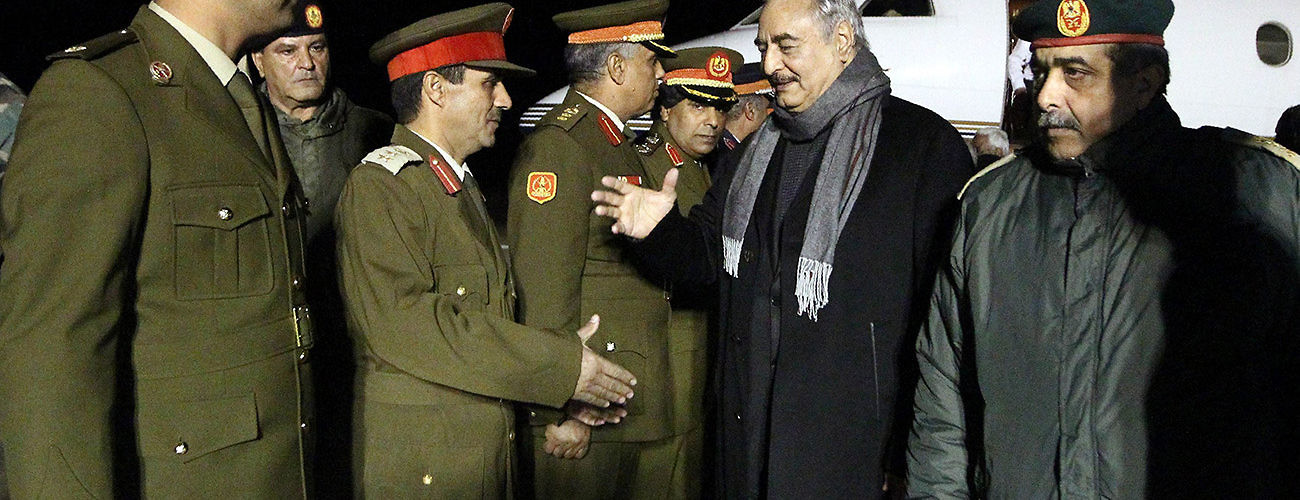Khalifa Haftar meets with troops after a visit to Russia. Benghazi, Libya, December 3, 2016. (Abdullah Doma/AFP/Getty Images)
Renewed efforts are now underway to overcome the gridlock in Libya’s peace process. The United Nations’ special representative to Libya, Martin Kobler, and neighboring states are in separate talks with the country’s various factions in an attempt to keep the peace process alive and prevent an escalation of tensions. The latest actor to enter the fray is Russian President Vladimir Putin, who could play a major role in getting key players to remain at the negotiating table.
The UN-brokered Libyan Political Agreement, which aimed to unite rival factions, appeared to be on the verge of collapse late last year. Implementation of the agreement, which was signed in Shirkat, Morocco, in December 2015, had come to a virtual standstill. The Government of National Accord (GNA) established under the agreement and led by Fayez al-Serraj still lacks a legitimate mandate to govern.
The eastern Libyans who dominate the House of Representatives—the country’s sole legitimate parliament under the political agreement—reject the GNA on the grounds that its Presidency Council lacks representation from their region. Eastern Libyans also want renegade general Khalifa Haftar as supreme commander of the army, though this decision rests with the Council.
In the meantime, Haftar has used the uncertainty surrounding the political agreement to make further military gains. He has captured several important oil terminals in the northeastern coastal region from forces loyal to the GNA. Gaining control of key infrastructure and allowing oil to be exported under the banner of the National Oil Company has significantly boosted Haftar’s influence and made his inclusion in the peace process indispensable.
This fact has not been lost on Putin, who has stepped up support for Haftar in recent months. While Russia officially supports the UN-backed GNA, it has often favored the Tobruk government and Haftar. Russian military advisers have reportedly been assisting Haftar’s forces. Haftar also made several trips to Moscow in the latter half of 2016 and, in January of this year, visited a Russian aircraft carrier as it returned to Russia from Syria. Reports soon emerged of an alleged agreement between Haftar and Putin to establish a Russian naval base off the coast of Benghazi. Putin has also flown injured fighters from Haftar’s forces to Russia for treatment.
Such close ties to Haftar could give Putin a potentially important role as negotiator in the Libyan crisis. At present, two sets of talks are being pursued. UN envoy Kobler reactivated the UN-led political process after the House of Representatives rejection of the GNA. After three months of discussions with rival factions, he announced in early February that a consensus was emerging on the need to amend the political agreement. This includes addressing the question of leadership of the army, in which Kobler now says Haftar must have a role, and the composition and role of the Presidency Council.
Neighboring states have also conducted talks with parties to the conflict. Reports recently emerged that Libyan factions had agreed to an Egyptian-brokered roadmap for a new political agreement, as well as new parliamentary and presidential elections in 2018. The plan encountered a setback, however, when Haftar pulled out of a meeting scheduled with Serraj in Cairo on February 14, perhaps in an effort to increase leverage. Egypt has since joined Algeria and Tunisia in launching a new round of negotiations.
Russia’s close ties to Haftar could prove critical in attracting the general’s support for an amended political agreement, if he can be convinced that it is his best chance of holding a future position of power. Serraj is expected to travel to Moscow in the days ahead to try to convince Putin to back the regionally brokered deal and act as an intermediary between himself and Haftar, attracting the general back to the table.
Moscow, however, is unlikely to find the Egyptian deal as it stands satisfactory. Under the roadmap, Haftar would become a commander of the army, but the functions of its supreme commander would be divided between the president of the House of Representatives, the president of the State Council, which advises the GNA, and Serraj, effectively sidelining Haftar in the decision-making process. Moscow has indicated it would ideally like to see supreme command of the armed forces be the responsibility of the country’s leader. Putin is also known to prefer that strongmen in the mold of Haftar fill such roles.
Russian engagement could be critical to both sets of talks now taking place regarding Libya. The danger for the UN may be that Putin, recognizing this, attempts to bring the Libyan stakeholders together on his own, much as he did with Syria. This would give Moscow much more influence over the terms of a political settlement. Despite its clear support for the Tobruk government and Haftar, Russia has already been reaching out to members of Libya’s other factions, including State Council President Abdulrahman Swehli and Presidency Council member Ahmed Maiteq. Reports have also emerged of a Russian delegation visiting the city of Misrata at the time that Haftar toured the aircraft carrier, though it was not publicized at the time. This could have been aimed at establishing contact with powerful Misratan militia leaders, who are also key players in Libya’s conflict.
Thus far, Russia’s efforts in Libya have failed to bear as much fruit as those in Syria. Alone, Moscow is unlikely to have enough leverage with all of Libya’s domestic stakeholders to nudge them toward a deal. Putin would need to cooperate not just with several key regional players, but also with a number of Western countries that have been heavily engaged in Libya in support of Haftar’s rivals, not least of which is the United States. The Libyan crisis therefore places further importance on the evolution of the relationship between Putin and US President Donald Trump.
Lisa Watanabe is Senior Researcher at the Center for Security Studies at ETH Zurich.





